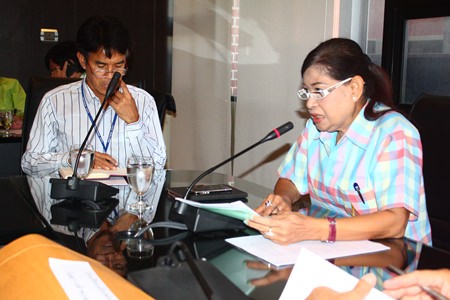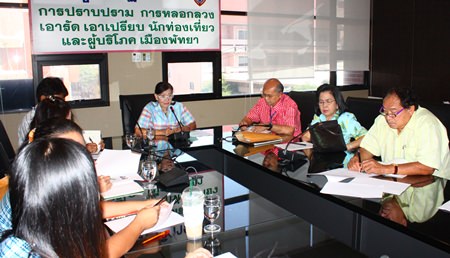Pattaya education officials are promising more teacher training and earlier student testing as the city scrambles to join Thailand’s promised “revolution” in education to reverse sliding standardized test scores.
At a Nov. 27 meeting with teachers and administrators from all 11 public schools, Education Department Director Jintana Maensurin unveiled a new “Literacy Guarantee” program to boost scores in reading and writing.
As part of the campaign, students will now be subjected to preliminary testing three months before Thailand’s Ordinary National Education Test for third and sixth graders. After scores are evaluated, additional teacher training, where needed, will begin in June.
 Jintana Maensurin (right), Pattaya’s Education Department Director.
Jintana Maensurin (right), Pattaya’s Education Department Director.
“In the past, schools have tried several methods to reduce the number of students who cannot read and write by dividing them into special classes that focused on spelling, reading in groups and presentation of materials to memorize,” Jintana said. However, she said, that has not helped, as Pattaya students fell below the already poor national O-Net average scores every year.
Out of full scores of 100, the average score for Thai language fell in 2012 from 42.61 to 41.88. Mathayom 6 students scored less than half of the possible total in all main subjects. In Pattaya, between 6 and 12 percent of third- and sixth-grade students failed the test altogether.
In September, the World Economic Forum reported that Thailand’s primary and secondary education system has slipped to 78th out of 144 nations globally – and last among eight ASEAN countries – in quality of education. In specific areas, the results were even worse. The kingdom ranks 101st in primary enrollment, 94th in secondary enrollment, 86th in the quality of its primary education, and 80th in the quality of its math and science education.

The damning report sent shockwaves through the country’s educational system, with Education Minister Chaturon Chaisaeng calling for a “revolution” that would deliver demonstrable results by 2015.
The Pattaya “Literacy Guarantee” campaign aims to bring Pattaya in line with national goals. In the first teaching session, Asst. Prof. Siwakan Pathumsut began discussion of guidelines to solve literacy issues, suggesting four new levels of teaching steps to be implemented in city schools.
Jintana said numerous factors are hindering education in Pattaya, ranging from student disinterest to learning impediments to home environment and teacher scarcity. The education minister conspicuously failed to assign any blame to teachers, whose measured performance has slid steadily even as their salaries have risen.

Thailand spends more of its gross domestic product on education – 19.1 percent in 2012 – than most of its ASEAN rivals. But the WEF noted in its report that simply throwing money at educational problems – such as Thailand’s populist pledge to supply tablet computers to all students – isn’t the answer.
Results from the 2009 Organization for Economic Cooperation and Development’s Programme for International Students Assessment test saw Thai students average 421 in reading literacy, compared with an OECD-country average of 493. The 2012 results were scheduled for release Dec. 3, but education officials already have said they expected them to be “unsatisfactory.”
Other organizations show the same. Thailand dropped from 46th in 2007 to 51st out of 57 countries in 2011 in an education-proficiency assessment by the International Institute for Management Development. In 2011, the Trends in International Mathematics and Science Study had Thais ranked 28th in math and 25th in science out of 45 countries.
Jintana pledged that Pattaya will not sit idly by and will continue to try and stamp out illiteracy.




